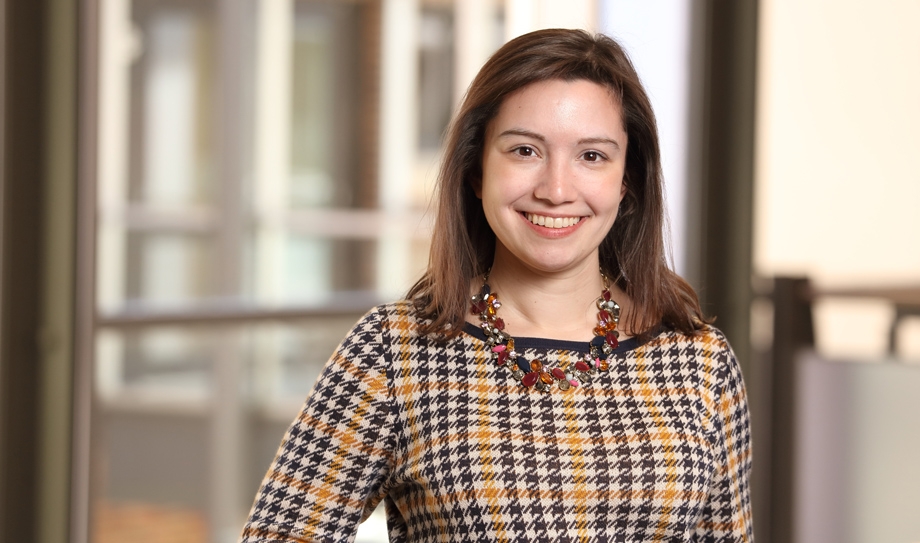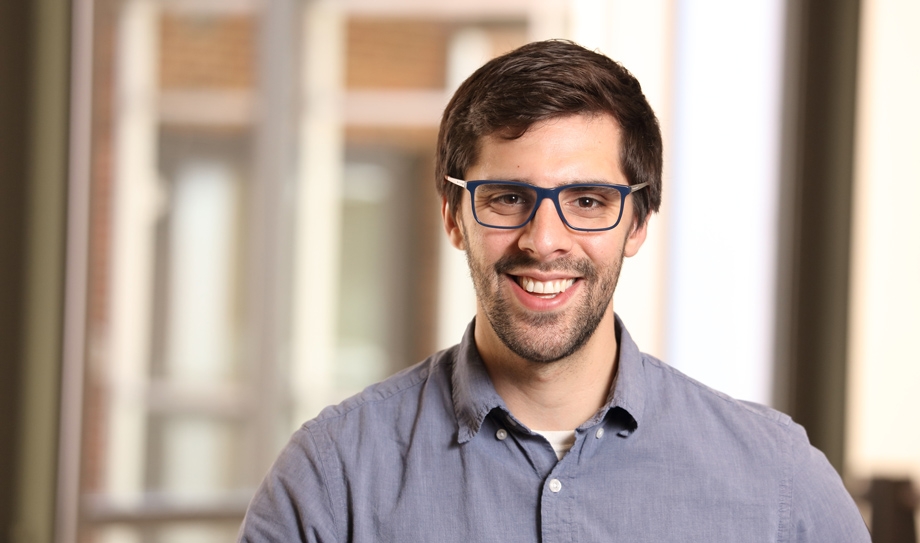Bringing an enthusiasm for research and a passion for teaching to the University of Virginia’s School of Engineering and Applied Science, two new tenure-track faculty in the Department of Chemical Engineering are already at work tackling some of the biggest challenges in their fields.
The addition in January of assistant professors Camille Bilodeau and Nick Vecchiarello bolsters the department’s community of dedicated educators and researchers and brings the number of newly hired faculty members since 2016 to 11 and the number of full-time primary faculty appointments in chemical engineering to 20.
With expertise in emerging computational methods and bioseparation technologies, Bilodeau and Vecchiarello bring complementary skill sets to the department’s strengths in molecular simulations, biomaterials, and development of new materials and technologies for applications in areas ranging from medicine to clean water.
“I’m very excited to have Nick and Camille join us,” said William Epling, department chair and Alice M. and Guy A. Wilson Professor of Chemical Engineering. “You can sense their enthusiasm for the research they do and a passion for teaching and to work with their students in research and discovery – not only the process, but the good that new knowledge brings in solving some of our biggest engineering challenges.”
Camille Bilodeau

A day in the lab for Bilodeau looks like a day in the office — a keyboard at her fingertips, a couple of computer monitors tiled with open windows. But there’s a lot going on in those windows that could lead to life-changing or life-saving technologies.
“I kind of feel like a hacker,” she said. “I literally do command-line work, with a lot of terminals open when I’m working.”
Bilodeau is hacking the secrets of the physical world’s smallest building blocks using math and physics — the chemical engineer’s traditional tools — and modern computing.
You may find her zooming in on the atomic interactions within a molecule in a computer-generated model — known as a molecular dynamics simulation — to study the atoms’ behaviors. Or she may be poring over terabytes of data from the simulation of a complex biological system.
Bilodeau’s research group at UVA takes advantage of huge leaps in computational speeds, which enable molecular simulations of large, complex systems. Her core expertise is in the molecular dynamics simulations of soft-matter systems and using artificial intelligence to explore the resulting data sets.
Her AI techniques include machine learning and deep learning “neural networks” — algorithms that mimic the human brain’s ability to recognize patterns and infer meaning from them.
“I’m interested in developing computational methods to discover and design new molecules with optimized properties for things like protein interactions for drug therapies or soft membranes used in separations technologies for energy or clean water,” said Bilodeau, who earned her B.S. and M.S. degrees in chemical engineering from Northwestern University and her Ph.D. from Rensselaer Polytechnic Institute in New York.
Bilodeau’s graduate research, which won RPI’s William N. Gill Prize for Excellence in Dissertation Research, focused on molecular simulations in protein purification processes using chromatography. Among her numerous graduate research honors, she spent nearly four years at the Lawrence Livermore National Laboratory as the fellow of Advanced Simulations and Computation.
After graduating from RPI in 2020, Bilodeau did postdoctoral research at the Massachusetts Institute of Technology in both the Department of Chemical Engineering and the Computer Science and Artificial Intelligence Laboratory.
One thing she loves about her work is that she’s rarely waiting for things to happen.
Simulations and training neural networks take time, but you can study one data set while another simulation is running, and it doesn’t take long to produce hours’ worth of data to explore, she said.
“Most of my time is spent studying what the simulation, or a neural network, did and why,” she said. “Every moment it feels like you’re graphing a new thing and running a new calculation. So it feels like five minutes later you could discover something new, and then five minutes after that you could discover something new.”
And there’s the problem-solving universality of combining computer science with chemical engineering, which holds answers to many of humanity’s urgent challenges, from emerging diseases to clean energy and beyond.
“I like picking broad toolkits and applying them to interesting questions,” Bilodeau said. “In theory, I’m sitting between computer science and chemical engineering, but in my mind, chemical engineering is where we’re really applying these techniques to solve real human problems.”
Nick Vecchiarello

Vecchiarello was on the front line when COVID-19 hit.
After earning his Ph.D. in chemical engineering at Rensselaer Polytechnic Institute in 2019, Vecchiarello worked as a separations scientist at drugmaker Amgen. There, he led a team in developing chromatography platforms for purifying drug substances, such as proteins, to produce new-generation drug therapies at manufacturing scale.
Biopharmaceutical manufacturers remove impurities from drug products, which is critical to their safety, by passing the biotherapeutic ingredient through a series of columns filled with millions of highly porous, chemically treated beads designed to separate the substance into its pure form.
Companies have chromatography down for established protein-based antibody drugs, but equivalent platforms don’t exist for some new therapies, such as those based on genes. Scrambling to create platforms to manufacture the new therapies on unprecedented timelines and scales in response to COVID was difficult and expensive.
“It got me thinking this is really an important problem and we’re not set up as an industry to deal with it,” Vecchiarello said. “So let’s go back and ask, can we come up with almost a future-proofed solution for these new separation materials?”
The question led him back into academic research, first as a postdoctoral associate at MIT and then to chemical engineering at UVA.
The research problem his lab will address lies in designing the right combination of moieties — a general term for molecular subunits with customizable properties — to apply to the chromatography beads to achieve chemical separation. Vecchiarello focuses on making peptides, which are fragments of proteins.
The idea is to build peptide moiety libraries from which manufacturers can choose.
“We’re trying to not just develop these materials but also gain a fundamental understanding of how these interactions occur between these gene therapy products and the chemical moieties that we’re designing,” Vecchiarello said.
“If we can map out those interactions, we can create small sets of chromatography materials that can purify wide ranges, or families, of different molecules for any new therapy that is created.”
He also wants to apply the techniques he’s using to develop chromatography materials in new research directions, including drug discovery and delivery methods. That made UVA an attractive landing spot for Vecchiarello because so many chemical engineering faculty members collaborate with researchers and clinicians in the School of Medicine.
Vecchiarello, who earned his undergraduate degree at the University of Massachusetts Amherst, also was drawn to the chemical engineering department’s teaching and advising ethos, he said.
Vecchiarello is a rarity in U.S. academia, where only a handful of chromatography research programs exist.
“Chromatography tends to be industrial-leaning,” he said. “People don’t oftentimes think of it as an academic problem, but I think there are a lot of important academic questions that still need to be addressed.”
It is not a coincidence that another of those rare labs is already right here, led by Lawrence R. Quarles Professor of Chemical Engineering Giorgio Carta — an internationally known figure in bioseparations across academia and industry and a revered mentor to generations of UVA chemical engineering students.
“The intention is to continue to have a strong biopurification program in the department,” Vecchiarello said. “Giorgio has been incredibly helpful, between sharing lab equipment and resources, making connections to his industry contacts and preparing for course prep.”